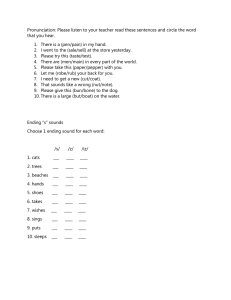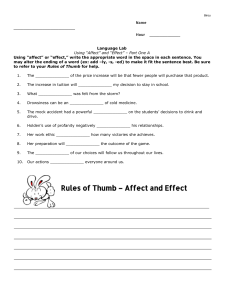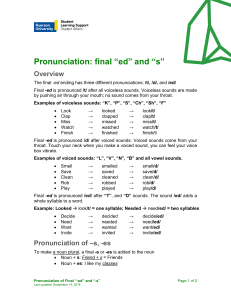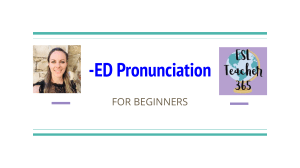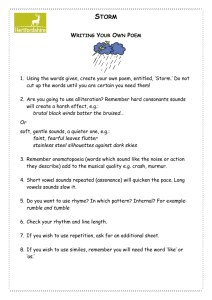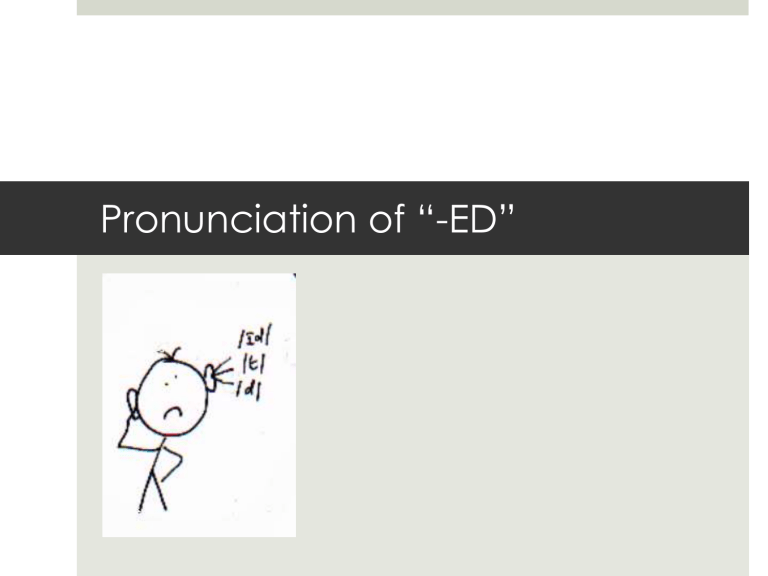
Pronunciation of “-ED” When we have regular past-tense verbs, they typically end in “-ed” There are 3 different sounds for “-ed” But, how do you know which sound a word makes? The final sound will largely depend on the last sound of the verb. * Place your fingertips on the front of your neck, and pronounce the following words. What do you feel on your fingers when you say the underlined sound? vow | fake (vvv | fff) zebra | snake (zzz | sss) When we pronounce voiced sounds, our vocal chords vibrate when we say those sounds. [v] [z]. When we pronounce voiceless sounds, our vocal chords do not vibrate. [f] [s]. No vibration. [t] final sound Verbs ending in voiceless sounds [p, k, f, s, ʃ, tʃ] cause the “-ed” ending to be pronounced as the voiceless [t] (with no vocal chord vibration). [p] “He popped a balloon.” [papt] [k] “They talked a lot” [takt] [f] “I laughed at the movie.” [læft] [s] “She kissed her child good-bye.” [kIst] [ʃ] “sh”: “We brushed our teeth.” [bruʃt] [tʃ] “ch”: “I reached the end of the road.” [riytʃt] [d] final sound Verbs ending in the voiced sounds [b, g, v, z, ʒ, dʒ, m, n, ŋ, r, l] cause the “ed” ending to be pronounced as a voiced [d]. [b] [g] [v] [z] [dʒ] [m] [n] [ŋ] [r] [l] “She grabbed her coat and ran away.” [grabd] “He begged her to stay.” [bɛgd] “They loved it.” [luvd] “He raised his hand.” [reyzd] “They managed the issue quickly.” [ mænɪdʒd] “She claimed the prize.” [kleymd] “They banned smoking in public spaces.” [bænd] “She banged on the door.” [bæŋd] “The waitress cleared the table.” [kliyrd] “I rolled up the paper.” [rowld] [ɪd] final sound Verbs ending in the sounds [t] or [d] will cause the “-ed” ending of a verb to be pronounced as the syllable [əd] or [ɪd]. [t] [t] [d] [d] “I visited the Empire State Building.” [vɪzɪtəd] “She edited the report.” [ɛdɪtɪd] “We ended the game early.” [ɛndɪd] “the chef breaded the chicken.” [brɛdɪd] Why are these rules important? Connected Speech [c+v] These “-ed” pronunciation rules are particularly important, because in English we connect our speech when we have a word that: • ends in a consonant; and • is followed by a word that begins with a vowel. In this case, the way you say the verb’s “-ed” ending will be heard loudly and clearly. For Example: “He walked away” [walkt] –> “He walk taway” [hiy WAWK təWEY] “She turned around.” Cont… …Cont. H- deletion The same rule of connected speech [c+v] occurs when h-deletion causes us to delete the “h” sound at the beginning of a word. “We raised her expectations” [reyzd] –> “We raizd her expectations” –> “We raizdər expectations” Pronunciation Quiz Smacked /t/ /d/ /ɪd/ Smacked /t/ /d/ /ɪd/ Landed /t/ /d/ /ɪd/ Landed /t/ /d/ /ɪd/ Informed /t/ /d/ /ɪd/ Informed /t/ /d/ /ɪd/ Mixed /t/ /d/ /ɪd/ Mixed /t/ /d/ /ɪd/ Rocked /t/ /d/ /ɪd/ Rocked /t/ /d/ /ɪd/ waited /t/ /d/ /ɪd/ waited /t/ /d/ /ɪd/ Skipped /t/ /d/ /ɪd/ Skipped /t/ /d/ /ɪd/ Scrubbed /t/ /d/ /ɪd/ Scrubbed /t/ /d/ /ɪd/ Cried /t/ /d/ /ɪd/ Cried /t/ /d/ /ɪd/ Wanted /t/ /d/ /ɪd/ Wanted /t/ /d/ /ɪd/ Learned /t/ /d/ /ɪd/ Learned /t/ /d/ /ɪd/ haunted /t/ /d/ /ɪd/ haunted /t/ /d/ /ɪd/ rented /t/ /d/ /ɪd/ rented /t/ /d/ /ɪd/ Killed /t/ /d/ /ɪd/ Killed /t/ /d/ /ɪd/ Laughed /t/ /d/ /ɪd/ Laughed /t/ /d/ /ɪd/ Helped /t/ /d/ /ɪd/ Helped /t/ /d/ /ɪd/ Shouted /t/ /d/ /ɪd/ Shouted /t/ /d/ /ɪd/

